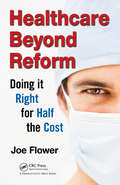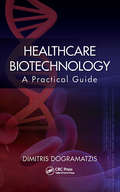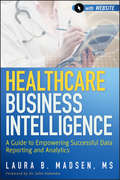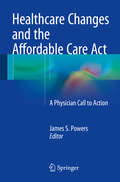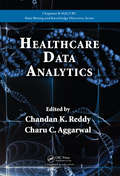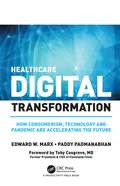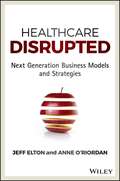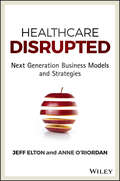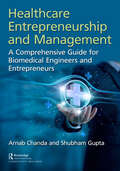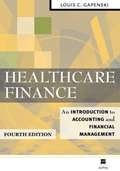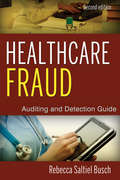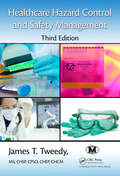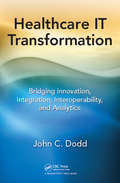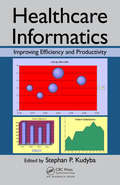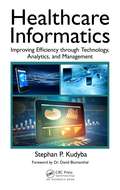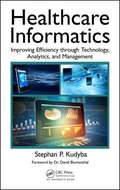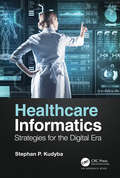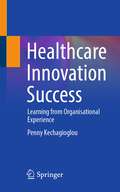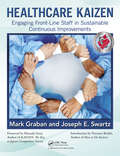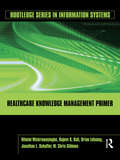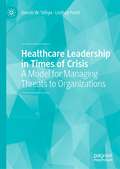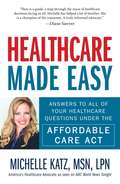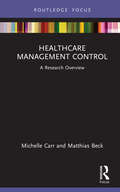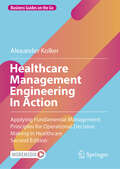- Table View
- List View
Healthcare Beyond Reform: Doing It Right for Half the Cost
by Joe FlowerThere is a secret inside healthcare, and it‘s this: We can do healthcare for a lot less money. The only way to do that is to do it a lot better. We know it‘s possible because it is happening now. In pockets and branches across healthcare, people are receiving better healthcare for a lot less. Some employers, states, tribes, and health systems are d
Healthcare Biotechnology: A Practical Guide
by Dimitris DogramatzisForeseeing and planning for all of the possibilities and pitfalls involved in bringing a biotechnology innovation from inception to widespread therapeutic use takes strong managerial skills and a solid grounding in biopharmaceutical research and development procedures. Unfortunately there has been a dearth of resources for this aspect of the field.
Healthcare Business Intelligence
by Laura B. MadsenSolid business intelligence guidance uniquely designed for healthcare organizations Increasing regulatory pressures on healthcare organizations have created a national conversation on data, reporting and analytics in healthcare. Behind the scenes, business intelligence (BI) and data warehousing (DW) capabilities are key drivers that empower these functions. Healthcare Business Intelligence is designed as a guidebook for healthcare organizations dipping their toes into the areas of business intelligence and data warehousing. This volume is essential in how a BI capability can ease the increasing regulatory reporting pressures on all healthcare organizations. Explores the five tenets of healthcare business intelligence Offers tips for creating a BI team Identifies what healthcare organizations should focus on first Shows you how to gain support for your BI program Provides tools and techniques that will jump start your BI Program Explains how to market and maintain your BI Program The risk associated with doing BI/DW wrong is high, and failures are well documented. Healthcare Business Intelligence helps you get it right, with expert guidance on getting your BI program started and successfully keep it going.
Healthcare Changes and the Affordable Care Act
by James S. PowersHealthcare Changes Reach Main Street: A Call to Action for Physicians provides guidance, examples, and information on processes and time lines for physicians based on the implementation of The Affordable Care Act (ACA) that was established in 2010. This volume focuses on how geriatricians and other healthcare professionals can be engaged in responding to the roll-out of the ACA in their communities, and through this engagement assume leadership roles in local hospitals, healthcare organizations, and medical societies to advance quality improvement and new models of care for older adults. In-depth chapters provide an update on quality improvement efforts at the state level, as well as changes in Medicaid financing and the significant impact this will have for older adults, particularly dual-eligibles. Many elements of the ACA are yet to be rolled out and many healthcare decisions are yet to be made. Healthcare Changes Reach Main Street: A Call to Action for Physicians will guide healthcare decision makers and help them to play a leadership role in advancing quality care for older adults in our changing healthcare environment.
Healthcare Data Analytics (Chapman & Hall/CRC Data Mining and Knowledge Discovery Series)
by Charu C. Aggarwal Chandan K. ReddyAt the intersection of computer science and healthcare, data analytics has emerged as a promising tool for solving problems across many healthcare-related disciplines. Supplying a comprehensive overview of recent healthcare analytics research, Healthcare Data Analytics provides a clear understanding of the analytical techniques currently available
Healthcare Digital Transformation: How Consumerism, Technology and Pandemic are Accelerating the Future (HIMSS Book Series)
by Edward W. Marx Paddy PadmanabhanThis book is a reference guide for healthcare executives and technology providers involved in the ongoing digital transformation of the healthcare sector. The book focuses specifically on the challenges and opportunities for health systems in their journey toward a digital future. It draws from proprietary research and public information, along with interviews with over one hundred and fifty executives in leading health systems such as Cleveland Clinic, Partners, Mayo, Kaiser, and Intermountain as well as numerous technology and retail providers. The authors explore the important role of technology and that of EHR systems, digital health innovators, and big tech firms in the ongoing digital transformation of healthcare. Importantly, the book draws on the accelerated learnings of the healthcare sector during the COVID-19 pandemic in their digital transformation efforts to adopt telehealth and virtual care models. Features of this book: Provides an understanding of the current state of digital transformation and the factors influencing the ongoing transformation of the healthcare sector. Includes interviews with executives from leading health systems. Describes the important role of emerging technologies; EHR systems, digital health innovators, and more. Includes case studies from innovative health organizations. Provides a set of templates and frameworks for developing and implementing a digital roadmap. Based on best practices from real-life examples, the book is a guidebook that provides a set of templates and frameworks for digital transformation practitioners in healthcare.
Healthcare Disrupted: Next Generation Business Models and Strategies
by Anne O'Riordan Jeff Elton<p>Healthcare Disrupted is an in-depth look at the disruptive forces driving change in the the healthcare industry and provides guide for defining new operating and business models in response to these profound changes. <p>Based on original research conducted by Accenture and years of experience working with the most successful companies in the industry, healthcare experts Jeff Elton and Anne O’Riordan provide an informed, insightful view of the state of the industry, what's to come, and new emerging business models for life sciences companies play a different role from the past in to driving superior outcomes for patients and playing a bigger role in creating greater value for healthcare overall. Their book explains how critical global healthcare trends are challenging legacy strategies and business models, and examines why historical leaders in the industy must evolve, to stay relevant and compete with new entrants. <p>Healthcare Disrupted captures this pivotal point in time to give executives and senior managers across pharmaceutical, biopharmaceutical, medical device, medical diagnostics, digital technology, and health services companies an opportunity to step back and consider the changing landscape. This book gives companies options for how to adapt and stay relevant and outlines four new business models that can drive sustainable growth and performance. It demonstrates how real-world data (from Electronic Medical Records, health wearables, Internet of Things, digital media, social media, and other sources) is combining with scalable technologies and advanced analytics to fundamentally change how and where healthcare is delivered, bridging to the health of populations, and broadening the resposibility for both. It reveals how this shift in healthcare delivery will significantly improve patient outcomes and the value health systems realize.</p>
Healthcare Disrupted: Next Generation Business Models and Strategies
by Anne O'Riordan Jeff Elton“During a time of tremendous change and uncertainty, Healthcare Disrupted gives executives a framework and language to determine how they will evolve their products, services, and strategies to flourish in a increasingly value-based healthcare system. Using a powerful mix of real world examples and unanswered questions, Elton and O’Riordan lead you to see that ‘no action’ is not an option—and push you to answer the most important question: ‘What is your role in this digitally driven change and how can your firm can gain competitive advantage and lead?’”—David Epstein, Division Head, Novartis Pharmaceuticals “Healthcare Disrupted is an inspirational call-to-action for everyone associated with healthcare, especially the innovators who will develop the next generation of therapeutics, diagnostics, and devices.”—Bob Horvitz, Ph.D., David H. Koch Professor of Biology, MIT; Nobel Prize in Physiology or Medicine “In a time of dizzying change across all fronts: from biology, to delivery, to the use of big data, Health Disrupted captures the impact of these forces and thoughtfully develops new approaches to value creation in the healthcare industry. A must-read for those who strive to capitalize on change and reinvent the industry.”—Deborah Dunsire, M.D., president and CEO, FORUM Pharmaceuticals Healthcare at a Crossroad: Seismic Shifts, New Business Models for Success Healthcare Disrupted is an in-depth look at the disruptive forces driving change in the the healthcare industry and provides guide for defining new operating and business models in response to these profound changes. Based on original research conducted by Accenture and years of experience working with the most successful companies in the industry, healthcare experts Jeff Elton and Anne O’Riordan provide an informed, insightful view of the state of the industry, what's to come, and new emerging business models for life sciences companies play a different role from the past in to driving superior outcomes for patients and playing a bigger role in creating greater value for healthcare overall. Their book explains how critical global healthcare trends are challenging legacy strategies and business models, and examines why historical leaders in the industy must evolve, to stay relevant and compete with new entrants. Healthcare Disrupted captures this pivotal point in time to give executives and senior managers across pharmaceutical, biopharmaceutical, medical device, medical diagnostics, digital technology, and health services companies an opportunity to step back and consider the changing landscape. This book gives companies options for how to adapt and stay relevant and outlines four new business models that can drive sustainable growth and performance. It demonstrates how real-world data (from Electronic Medical Records, health wearables, Internet of Things, digital media, social media, and other sources) is combining with scalable technologies and advanced analytics to fundamentally change how and where healthcare is delivered, bridging to the health of populations, and broadening the resposibility for both. It reveals how this shift in healthcare delivery will significantly improve patient outcomes and the value health systems realize.
Healthcare Entrepreneurship and Management: A Comprehensive Guide for Biomedical Engineers and Entrepreneurs
by Arnab Chanda Shubham GuptaPost pandemic, the world is not the same place. There has been an increasing focus on healthcare and well-being, which has created a once-in-a-lifetime opportunity for healthcare innovations and startups. From adoption of a range of medical apps and telemedicine technologies to heightened public interest in smart wearables and medical devices, the demand for efficient healthcare delivery has been skyrocketing. This book aims to serve as a first-of-its-kind guide for skill development in conception to commercialisation of healthcare products and services. It covers the gamut from the study of healthcare challenges, such as understanding customer requirements, market needs, and competition, to the various steps of the healthcare product development process, such as defining value propositions and specifications, the creation of minimum viable product (MVP) to prototyping, and manufacturing. The authors also discuss key commercialisation and management strategies, including the development of a robust business plan, fund raising, intellectual property, creating barriers to entry, and launching healthcare startups. Medical product pricing, positioning, sales and distribution, and customer acquisition are also presented with real-life examples. This book serves as a key reference not only for biomedical engineers who are looking to launch their products or services in the market but also for budding entrepreneurs willing to explore opportunities in the healthcare domain. For example, engineers and managers working on the development of medical devices require knowledge of ethical guidelines, regulations, and approvals to effectively launch their products in the medtech industry. On the other hand, entrepreneurs looking to benefit from the booming healthcare industry will find this book helpful in understanding the fundamentals of medical product development and commercialisation to launch their ideas successfully.
Healthcare Finance: An Introduction to Accounting and Financial Management (Fourth Edition)
by Louis C. GapenskiLike its predecessors, this textbook teaches the reader the fundamental concepts of healthcare finance, including both financial management and accounting. The fourth edition features: New or expanded coverage of: Municipal bond pools, Cost of capital for not-for-profit and small businesses, Modified internal rate of return, Supply chain management , Health savings accounts, Current information on reimbursement, along with updated real-world examples, Easy-to-grasp spreadsheet illustrations of the calculations throughout the book Learning aids, including a glossary; self-test questions; and end-of-chapter key concepts, questions, and problems
Healthcare Fraud
by Rebecca S. BuschAn invaluable tool equipping healthcare professionals, auditors, and investigators to detect every kind of healthcare fraudAccording to private and public estimates, billions of dollars are lost per hour to healthcare waste, fraud, and abuse. A must-have reference for auditors, fraud investigators, and healthcare managers, Healthcare Fraud, Second Edition provides tips and techniques to help you spot--and prevent--the "red flags" of fraudulent activity within your organization. Eminently readable, it is your "go-to" resource, equipping you with the necessary skills to look for and deal with potential fraudulent situations.Includes new chapters on primary healthcare, secondary healthcare, information/data management and privacy, damages/risk management, and transparencyOffers comprehensive guidance on auditing and fraud detection for healthcare providers and company healthcare plansExamines the necessary background that internal auditors should have when auditing healthcare activitiesManaging the risks in healthcare fraud requires an understanding of how the healthcare system works and where the key risk areas are. With health records now all being converted to electronic form, the key risk areas and audit process are changing. Read Healthcare Fraud, Second Edition and get the valuable guidance you need to help combat this critical problem.
Healthcare Hazard Control and Safety Management
by James T. TweedyComprehensive in scope, this totally revamped edition of a bestseller is the ideal desk reference for anyone tasked with hazard control and safety management in the healthcare industry. Presented in an easy-to-read format, Healthcare Hazard Control and Safety Management, Third Edition examines hazard control and safety management as proactive funct
Healthcare IT Transformation: Bridging Innovation, Integration, Interoperability, and Analytics
by John C. DoddThis book gives examples from healthcare institutions that are using IT automation and innovation to drive change and provides guidance on the strategic direction of HIT over the next five years. Improving the delivery of healthcare through HIT is vital for both the economic success of healthcare organizations and the care of the patient, but most EMR systems do not have an integrated and architected approach. This book provides a detailed approach on how to leverage IT for transformation. It also shows how to build upon the experiences of other industries and helps foster innovation by providing a vision of where technology can be an enabler.
Healthcare Informatics: Improving Efficiency and Productivity
by Stephan P. KudybaHealthcare Informatics: Improving Efficiency and Productivity examines the complexities involved in managing resources in our healthcare system and explains how management theory and informatics applications can increase efficiencies in various functional areas of healthcare services. Delving into data and project management and advanced analytics,
Healthcare Informatics: Improving Efficiency through Technology, Analytics, and Management
by Stephan P. KudybaHealthcare Informatics: Improving Efficiency through Technology, Analytics, and Management supplies an understanding of the different types of healthcare service providers, corresponding information technologies, analytic methods, and data issues that play a vital role in transforming the healthcare industry. All of these elements are reshaping the various activities such as workflow and processes of hospitals, healthcare systems, ACOs, and patient analytics, including hot spotting, risk stratification, and treatment effectiveness.A follow-up to Healthcare Informatics: Improving Efficiency and Productivity, this latest book includes new content that examines the evolution of Big Data and how it is revolutionizing the healthcare industry. It presents strategies for achieving national goals for the meaningful use of health information technology and includes sound project management principles and case illustrations for technology roll-out, such as Computer Physician Order Entry (CPOE) for optimal utilization.The book describes how to enhance process efficiency by linking technologies, data, and analytics with strategic initiatives to achieve success. It explains how to leverage data resources with analytics to enhance decision support for care providers through in-depth descriptions of the array of analytic methods that are used to create actionable information, including Business Intelligence, Six Sigma, Data, and Text Mining.
Healthcare Informatics: Improving Efficiency through Technology, Analytics, and Management (2nd Edition)
by Stephan P. KudybaHealthcare Informatics: Improving Efficiency through Technology, Analytics, and Management supplies an understanding of the different types of healthcare service providers, corresponding information technologies, analytic methods, and data issues that play a vital role in transforming the healthcare industry. All of these elements are reshaping the various activities such as workflow and processes of hospitals, healthcare systems, ACOs, and patient analytics, including hot spotting, risk stratification, and treatment effectiveness.
Healthcare Informatics: Strategies for the Digital Era
by Stephan P. Kudyba"This book addresses how health apps, in-home measurement devices, telemedicine, data mining, and artificial intelligence and smart medical algorithms are all enabled by the transition to a digital health infrastructure…..it provides a comprehensive background with which to understand what is happening in healthcare informatics and why."—C. William Hanson, III, MD, Chief Medical Information Officer and Vice President, University of Pennsylvania Health System. "This book is dedicated to the frontline healthcare workers, who through their courage and honor to their profession, helped maintain a reliable service to the population at large, during a chaotic time. These individuals withstood fear and engaged massive uncertainty and risk to perform their duties of providing care to those in need at a time of crisis. May the world never forget the COVID-19 pandemic and the courage of our healthcare workers".—Stephan P. Kudyba, Author Healthcare Informatics: Evolving Strategies in the Digital Era focuses on the services, technologies, and processes that are evolving in the healthcare industry. It begins with an introduction to the factors that are driving the digital age as it relates to the healthcare sector and then covers strategic topics such as risk management, project management, and knowledge management that are essential for successful digital initiatives. It delves into facets of the digital economy and how healthcare is adapting to the geographic, demographic, and physical needs of the population and highlights the emergence and importance of apps and telehealth. It also provides a high-level approach to managing pandemics by applying the various elements of the digital ecosystem. The book covers such technologies as: Computerized physician order entry (CPOE) Clinical Information Systems Alerting systems and medical sensors Electronic healthcare records (EHRs) Mobile healthcare and telehealth. Apps Business Intelligence and Decision Support Analytics Digital outreach to the population Artificial Intelligence The book then closes the loop on the efficiency enhancing process with a focus on utilizing analytics for problem solving for a variety of healthcare processes including the pharmaceutical sector. Finally, the book ends with current and futuristic views on evolving applications of AI throughout the industry.
Healthcare Infrastructure, Resilience and Climate Change: Preparing for Extreme Weather Events
by Virendra Kumar Paul Abhijit Rastogi Sumedha Dua Chaitali BasuThis book highlights the vulnerability of healthcare buildings in the context of climate change-triggered extreme weather events (EWEs) and the case for mitigation. With a concise discussion on climate change and its consequences in the form of such events, a cost model and equations that register losses and help quantify them are then presented. The model can be used to estimate the significant potential loss that might occur during an EWE and help healthcare facilities prepare for them. The book analyses cases of major EWEs in India over the last two decades and collates the data available into various categories. Through this research the authors have developed a framework which assists healthcare facilities with a detailed calculation of value losses, both tangible and intangible. The framework can be used to assess the impacts on healthcare buildings in terms of disruption of services so that appropriate decisions related to the resilience in healthcare planning can be taken into consideration. Thus, the book is useful for directing planning and design processes aimed at continuity of service and building resilience to perform in the face of natural disaster and extreme weather. The purpose of this book is to prompt facilities planners and healthcare facilities to prepare to respond to EWEs through the planning and design process in a rational manner. Built infrastructure professionals such as architects and engineers, policy makers, and academics with an interest in disasters, risk and climate change will all find this book to be key reading.
Healthcare Innovation Success: Learning from Organisational Experience
by Penny KechagioglouThe role of leadership in driving innovation through its different stages is fully explored in this book to enable clinical leaders and managers to design innovation frameworks. The book highlights how to maximize the benefits of innovation for organizations and integrated care systems while acknowledging that the process of innovation within healthcare organizations can be complex and needs to be well orchestrated to enable innovation to spread and sustain. The book examines the leadership enablers in healthcare innovation highlighting a new and refreshing strategic model of innovation. The model is used as the foundation to support the process of innovation, from ideation to implementation, within contemporary and ambitious healthcare organizations.
Healthcare Kaizen: Engaging Front-Line Staff in Sustainable Continuous Improvements
by Mark Graban Joseph E. SwartzHealthcare Kaizen focuses on the principles and methods of daily continuous improvement, or Kaizen, for healthcare professionals and organizations. Kaizen is a Japanese word that means "change for the better," as popularized by Masaaki Imai in his 1986 book Kaizen: The Key to Japan‘s Competitive Success and through the books of Norman Bodek, both of whom contributed introductory material for this book.Winner of a 2013 Shingo Research and Professional Publication Award!In 1989, Dr. Donald M. Berwick, founder of the Institute for Healthcare Improvement and former administrator of the Centers for Medicare & Medicaid Services, endorsed the principles of Kaizen in the New England Journal of Medicine, describing it as "the continuous search for opportunities for all processes to get better." This book shows how to make this goal a reality.Healthcare Kaizen shares some of the methods used by numerous hospitals around the world, including Franciscan St. Francis Health, where co-author Joe Swartz has led these efforts. Most importantly, the book covers the management mindsets and philosophies required to make Kaizen work effectively in a hospital department or as an organization-wide program.All of the examples in the book were shared by leading healthcare organizations, with over 200 full-color pictures and visual illustrations of Kaizen-based improvements that were initiated by nurses, physicians, housekeepers, senior executives and other staff members at all levels.Healthcare Kaizen will be helpful for organizations that have embraced weeklong improvement events, but now want to follow the lead of ThedaCare, Virginia Mason Medical Center, and others who have moved beyond just doing events into a more complete management system based on Lean or the Toyota Production System.
Healthcare Knowledge Management Primer (Routledge Series in Information Systems)
by Nilmini Wickramasinghe Rajeev K. Bali Brian Lehaney Jonathan Schaffer M. Chris GibbonsQuality care of patients requires evaluating large amounts of data at the right time and place and in the correct context. With the advent of electronic health records, data warehouses now provide information at the point of care and facilitate a continuous learning environment in which lessons learned can provide updates to clinical, administrative, and financial processes. Given the advancement of the information tools and techniques of today’s knowledge economy, utilizing these resources are imperative for effective healthcare. Thus, the principles of Knowledge Management (KM) are now essential for quality healthcare management. The Healthcare Knowledge Management Primer explores and explains essential KM principles in healthcare settings in an introductory and easy to understand fashion. This concise book is ideal for both students and professionals who need to learn more about key aspects of the KM field as it pertains to effecting superior healthcare delivery. It provides readers with an understanding of approaches to KM by examining the purpose and nature of its key components and demystifies the KM field by explaining in an accessible manner the key concepts of KM tools, strategies and techniques, and their benefits to contemporary healthcare organizations.
Healthcare Leadership in Times of Crisis: A Model for Managing Threats to Organizations
by Dennis W. Tafoya Lindsey PoethThis book addresses the challenges that healthcare organizations experience when attempting to manage the emergence of troublesome events or crises. It illustrates how experiences gained from event and crisis containment efforts can better prepare these organizations to prevent and/or manage other crises they may experience. Using a model outlining the relationship between a mismanaged event and the triggering of a crisis, the author defines the role of the leadership in healthcare organizations when developing, launching, and managing plans and programs to deal with these dangerous challenges brought on by crises, catastrophes, and disasters to their stakeholder networks. Readers with expertise in leadership and crisis management in general and healthcare management specifically will find this text useful in linking leadership expectations and competencies to event and crisis containment efforts.
Healthcare Made Easy: Answers to All of Your Healthcare Questions under the Affordable Care Act
by Michelle KatzAn easy-to-understand guide to the Affordable Care Act!Written by ABC World News' Real Money expert and healthcare advocate Michelle Katz, Healthcare Made Easy is the ultimate resource for understanding and navigating the Affordable Care Act. Using simple and easy-to-follow language, she answers important questions about the ACA, such as:Are there any exemptions to buying insurance under the Affordable Care Act?What is the new "80/20 Rule"? And what exactly is the Early Retiree Reinsurance Program?What does the ACA mean for small businesses? What benefits must you offer and what are the tax breaks?What is covered for your children under the new CHIP laws?How can you get pharmaceutical companies to lower your prescription costs? With the expert advice in Healthcare Made Easy, you will learn how to get the most out of your healthcare plan without having to sacrifice your needs or empty your pockets."Here is a guide, a map through the maze of healthcare decisions facing us all. Michelle has helped a lot of families. She is a champion of the consumer. A truly informed advocate." --Diane Sawyer"Michelle breaks down complicated laws and insurance regulations to make them understandable to everyone. She provides you with a road map to getting the best healthcare at the most affordable prices." --Tavis Smiley, Author, Television and Radio Host
Healthcare Management Control: A Research Overview (State of the Art in Business Research)
by Matthias Beck Michelle CarrThe COVID-19 pandemic has created unprecedented challenges to those responsible for the management of healthcare activities. These challenges require decision makers at all levels to possess a broad and comprehensive understanding of healthcare management tools, and especially of the interaction between formal control systems and the informal power dynamics which operate within healthcare organisations. Managing in healthcare is not only difficult because of the sector’s high-stakes ethical contexts but also because the health care workforce is inherently complex and heterogeneous. It is the purpose of this book to survey the expanding literature on management control in healthcare with the aim of giving readers a better understanding of the options available to managers, decision-makers and also educated observers of this important sector. This book summarises key debates and findings in this rapidly developing and increasingly important field. It explores state-of-the-art models and approaches, highlights unexplored questions and gives an outlook on novel and developing trends. In so doing it provides a hands-on-guide for aspiring healthcare managers and practitioner and offers critical insights into the more advanced academic literature for those seeking a thorough grounding in the accounting and finance aspects of healthcare management.
Healthcare Management Engineering In Action: Applying Fundamental Management Principles for Operational Decision Making in Healthcare (Business Guides on the Go)
by Alexander KolkerThe updated 2nd edition of Healthcare Management Engineering In Action in the Business Guides on the Go series provides a comprehensive exploration of healthcare management operations. Through a systematic comparison of predictive and analytic decision-making methodologies with traditional management approaches, the book employs case studies derived from real-world hospital and clinic scenarios. It addresses a spectrum of problem encompassing patient flow, capacity management, resource allocation, staffing and scheduling, statistical data analytics, and cost distribution among cooperating providers.The revised edition contains enhanced content, spotlighting key management principles vital for effective operational decision-making. The book encompasses a wide array of quantitative methods, including discrete event simulation, queuing analytic theory, linear, integer and probabilistic optimization, among others. By acting as a bridge between management engineering experts and healthcare administrators, Healthcare Management Engineering is an invaluable resource for hospital and clinic leadership, aiding them in their managerial roles. Furthermore, it serves as a comprehensive repository of introductory challenges and projects suitable for graduate-level students in healthcare management and administration.
